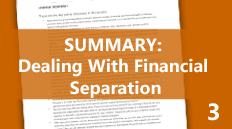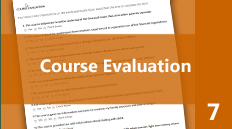| * |
Separation is a process that affects a person’s physical, mental, emotional and financial health. It affects a person’s ability to take in information and to make financial decisions. It is important for you to take your time before making these decisions. |
| * |
The financial impact of separation for each spouse is different. After separation each spouse’s path to economic stability is likely to be different. |
| * |
Separation and divorce not only affects the standard of living of parents and children, it also has an emotional impact on parents and children. Parents need to be sure to make decisions that are in the best interests of the children. |
| * |
Destructive anger and ongoing resentment can follow a separation. This has a potential financial and emotional cost on the parents as well as the children. |
| * |
When there is a financial inequality between separated parents there may also be a financial power imbalance which may lead to financial abuse. |
| * |
Financial abuse can take many forms but usually involves forcing the victim to be financially dependent on the abuser because his or her access to money and financial information has been cut off. |
| * |
Parents need information on the effect of conflict on children, how to avoid undermining the other parent, and how to keep children out of the middle of discussions about finances and support issues. |
| * |
Financial hardship and other socio-economic circumstances, before as well as after separation, play an influential role in affecting children’s educational achievements. |
| * |
Children learn by observation and example so it is important for parents to talk to their children about money matters in very concrete terms. The focus should be on the concepts of earning, spending, saving, borrowing and sharing. Help them to manage their own money and teach them good money habits. |
| * |
It is important to understand some of the issues that you may have to deal with before, during and after separation. Parents are in a much stronger position if they start to address their money issues at the point at which they find themselves considering separation or divorce. |
| * |
Parents who are breaking up should be moving toward eliminating the financial ties to their former partner. The goal is to create two financially separate households. Parents need to work together to negotiate agreements about guardianship, child support, spousal support and property division. |
| * |
Parents may have difficulty talking about financial issues and may benefit from coaching on how to set up a business-like relationship with each other to communicate about financial issues. It is important to work together to deal with unexpected expenses for your children. Staying focused on your children’s needs and involving each other in the decision-making are helpful strategies. |
| * |
After separation, parents need to know where to start and where they can turn for help with financial issues – especially when they are working out important issues like division of property, child support and spousal support. They can use alternate dispute resolution options for dealing with finances such as mediation and collaborative law. |










